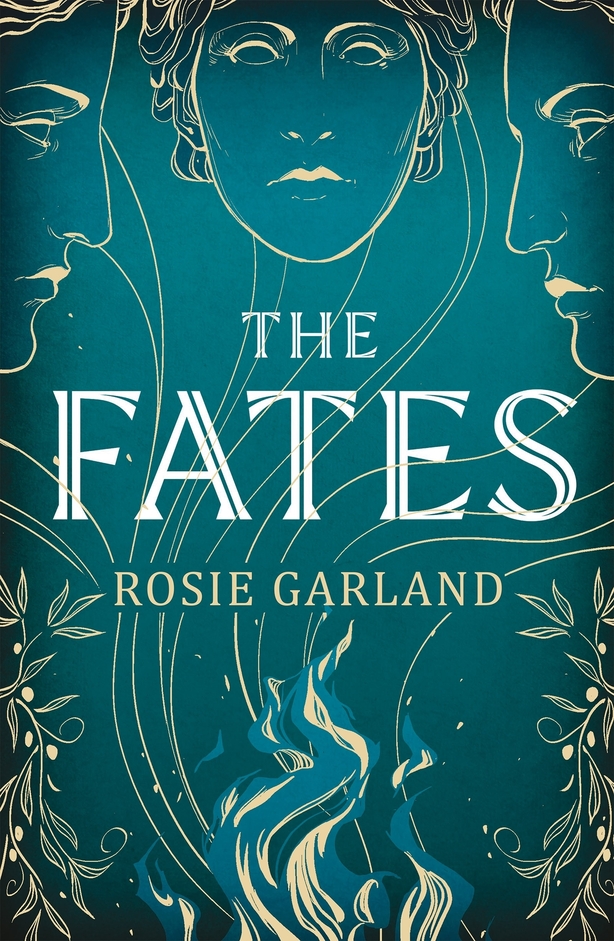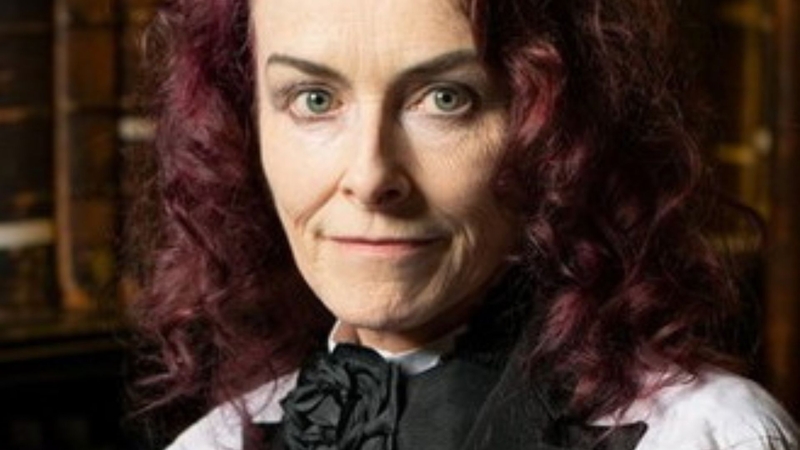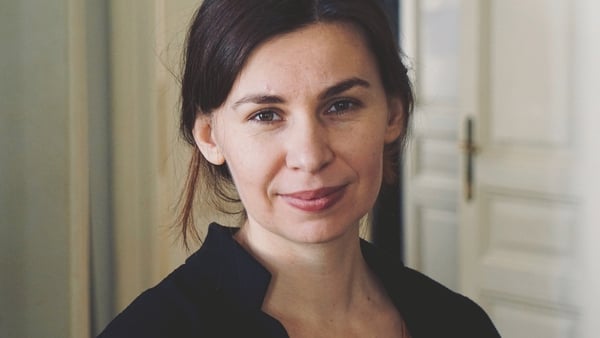We prsent an extract from The Fates, the new novel by Rosie Garland.
Before Gods and mortals, there were The Fates - three sisters born out of Nyx's darkness, destined to weave the lives, and deaths, of humankind for eternity. But immortality is a heavy burden, and Clotho, Lachesis and Atropos are captivated by the gloriously human lives of the mortals below, especially those of the great warrior Atalanta and her ill-fated lover, Meleager. However, being a Goddess of Fate doesn't make you a master of it. Will these three sisters find a way to free the couple, and themselves, from their destinies? Or will they be bound by Fate forever?
Cruel Fates, malevolent Fates, haggard and heartless.
So say the storytellers, when speaking of us. You have heard the legends wherein we are vicious crones, three weird sisters who cackle over the meagre span of years we allot to men, smug in our own boundless aeons. You have seen the sculptures portraying us foul-featured, our breasts dry folds of skin draping our ribs. There is bent-backed Clotho, gnarled fingers grasping the distaff as she spins the thread of mortal destiny. There is beak-nosed Lachesis, squinting a rheumy eye as she measures how long a single life will last. Last and most terrifying of all is Atropos the Inflexible, who severs the thread of life and allows not one instant longer.
Since the first tale was told around the first hearthside, we have been silenced and slandered. We have held our peace for too long. Draw close. For the first time, we shall speak in our own voices, and tell the plain truth.
Before the Gods were, we are.
We exist outside the mortal reckoning of Time, with its tidy parcelling into Time Was, Time Is, and Time To Come. We are as far beyond such distinctions as a shooting star and the child who looks up in wonder.
When the Gods are not yet born, our mother Nyx claps her hands in the deeps of the abyss and brings forth light. She sets her shoulder to the Wheel of Time and sets it rolling. Grabs a handful of dust and names it Earth, weeps tears and names them Ocean; squeezes three daughters from her fathomless body and names us Clotho, Lachesis and Atropos.
While the world burns and cools, Nyx teaches us how all life springs from stardust, and to stardust all life returns.
We watch as Nyx brings forth the Titans, and then the Gods. She scoops river clay and fashions the mortals. Male and female she creates them, and they dance in the garden of their infancy. Foolish and fragile, they make easy prey for beasts of land and air and water. Before they are half-begun, their numbers dwindle into danger.
It is then our mother Nyx teaches us our essential place in the pattern: to craft, shape and seal mortal destiny. To do this, we spin the thread of existence, measure out each flicker and then sever the link with life and breath. We tighten a cord of protection around their fleeting lives so they may multiply.
Sister Clotho reaches into the heavens and wraps a skein of stars around her distaff. She swings the spindle and teases out a glimmering thread, entwined with the tenacity at the heart of creation, for mortals need its dogged persistence in order to thrive.
Sister Lachesis hefts her measuring rod, a beam of divine light true as a comet's tail. She measures each according to their fate, stretching mortal lives long enough for learning. Finally, sister Atropos swishes her shears and cuts the thread. Each creature needs an ending so it might lay down its aching years and sleep.
In the beginning we spin lives without struggle. Mortals eat and breed and die, over and over, with no more significance than limpets suckling rocks that string the shore. But all life must have meaning, from the smallest ant to the tallest forest pine, and Mother Nyx does not intend for humankind to live like limpets. There is much in store for this most wonderful of Nyx’s creations.
So we twist hunger into the thread; fear as well as desire; struggle and hardship as well as satisfaction. A little here, a little there. To each, we measure fairly, mixing good luck and bad. We shepherd their curious natures, weave caution, and watch the aching slowness of their increase. For ages beyond reckoning, we shape ordered lives, coaxing and nudging mortals to shine bright as the stars from which they are made. They are our progeny; toddling babes who stumble and fall, stumble and fall again. We pick them up, shush their weeping, and urge them to go on.
Mortals face our challenges, push against them, and grow. As well-reared children, they blossom. They venture out of Eden, planting anxious footsteps through forest and tundra, desert and ice. With strict destinies, we hone their intellect. They learn quickly because they have to.
We do not goad alone. There are gifts also. They discover the pharmacopoeia Nyx has planted in every tree and leaf; the wisdom to track a bird to its nest, a scatter of saplings to a spring. They weave songs so enchanting the very birds fall silent, paint their caves with beasts so wondrous we can hear panting breath. They learn love, such a sweet discovery they dive in and out of it a hundred times in one lifespan.
They learn to sow and reap, and for the first time fill their bellies to bursting. We wonder if they will grow lazy, but they confound all expectation. They build: first wood, then clay, then stone; each generation impelled by the destinies we weave to outshine the last. And always, they gaze into the heavens and feel the echo of stardust in their bones.
In the heavens meanwhile, the squabbles of Gods and Titans overspill into violence and war. The victorious Gods wreak vengeance on the vanquished. When done with punishment, they turn their attention to the mortal creatures far below, taking some as playthings and breaking them with their ungentle touch.
We blink and human empires rise and fall, rise and fall again. Through it all, we spin and measure and snip. We are The Fates and nothing can change us. We shall be here when the world crumbles into final dust; shall be here when Nyx breathes out new stars for Clotho to wind around her distaff, and the cycle of life begins once more.
We are endless. For us, there is no death. Neither is there growth. We spin the radiant thread of life yet can only watch as mortals revel in its urgent and tantalising joy. Not for us the leaping of the heart with new love, nor the agony of grief. Not for us the singing of the blood when running a race, nor the exhilaration of diving into a lake’s frigid depths.
We gaze down at Earth and sigh. We hear the lies. We are blamed for bad luck and bad judgement, accident and happenstance, envy and betrayal, for every sly knife in the back. We shrug it off, keep our own counsel, and we spin and measure and snip.
And now, we are forsworn to a special task: to keep a vigil over the lives and destinies of two mortals. We watch the huntress Atalanta: Fleet-of-Foot, Equal-in-Weight, beloved of Artemis. We watch Meleager, hero of the Argonauts. He left his home a dozen years ago and the desertion weighs heavy on his conscience. We peer into his heart: snarled up in hatred for The Fates. And why? He blames us for laying a curse upon his life. Meleager is angry, desperate and lost, a dangerous combination.
Follow the line of our intention, from Olympos down to the middle sea. Atalanta stands at the prow of her ship, peering ahead, eagle-eyed and eager. Wind tangles her hair; her bow is slung across her breast, arrows tipped and ready. She is bound for Calydon and her friend Meleager.
Ah, Calydon! Famed for its temples heaped with gold, its olives groves and vineyards; famed for its fields bursting with wheat, as though Demeter upended her cornucopia and spilled out the entire bounty of her harvest.
Look again.
A pall of misery stretches over the kingdom. Famine has trampled the cow pastures to slurry. The cornfields are churned into empty dust; fruit trees display bare ribs of branches. The land shrivels. The people cower. They hear the thunder of a monster rumbling through the earth: the boar that has laid waste to their home. No one can rid them of this curse. A legion of brave men have lost their lives trying. We spin, we measure, we snip. Across the gem-green sea, Atalanta and Meleager are hastening toward their fates and we must follow. On their frail mortal shoulders rests the future hope and destiny of all humanity. More than Achilles, Agamemnon, Theseus and Helen combined, this man and woman will change the course of history for ever. At what dreadful cost, we shall reveal.

The Fates is published by Quercus

